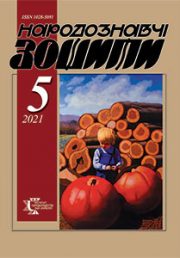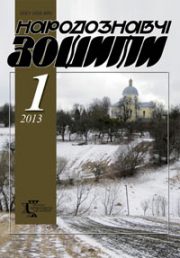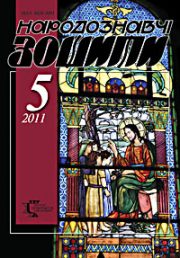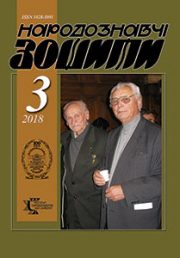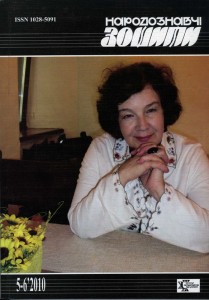2010 year, issue 5-6
Pavluk Stepan. Small Islands of Ukrainian Life upon Southern Amercan Continent. P. 506-508
read »
Kyrchiv Roman. A Road to Science. P. 509-510
read »
Makarchuk Stepan. From Ukraine to Argentina — Scientist’s Research. P. 511-513
read »
Vynohradska Halyna. «Bring me a word and I shall see yourself»: On Some Conferences with Oksana Sapelyak. P. 514-517
read »
Horyn Vasyl. When We Did Not Yet Wear Jeans (In the Basis of a Silhouette Was Laid a Greeting Adress Proclaimed by Author at Jubilant Honouring of O. Sapelyak on April 20th, 2010) 518-521
read »
Pletenchuk Natalia. «This is a Spirit’s Trip». P. 522-522
read »
Rybchynska Nina. A Step to Renovation of Historic Justice. P. 523-523
read »
Sapelyak Oksana. Ukrainian Salesian Congregation of Byzantian Rite: Additions to History of Formation. P. 524-533
read »
Balahutrak Mykola. Principles of Ethnical Psychology as a Science and Formation of Ones in Ukrainian Ethnology at XIX c. P. 534-542
read »
Tarasiuk Iryna. People’s Religious Grounds in Tradition of Ukrainian Hospitality (after Materials of Paroemias). P. 543-554
read »
Dyakiv Volodymyr. On Socio-Political Preconditions of Peculiar Forms in People’s Religiousness at Under-Soviet Ukraine During 1930s. P. 555-565
read »
Horoshko Lesya. «The Devil is afraid of Fire but dwells in Water» (The Ukrainians’ Traditional Notions of Water as a Site of Mythological Creatures). P. 566-574
read »
Taras Yaroslav. On Architectural Ethnographic Mapping of Objects of Sacral Wooden Architecture as a Basis for Historio-Ethnogaphic Regionalization and Administrative Territorial Arrangement of Ukraine. P. 575-585
read »
Bilous Vira. On Ethnographic and Natio-Educative Activities by M. Hulak and M. Navrotsky at Trans-Caucasia. P. 586-594
read »
Drohobytska Oksana. Intellectuals of Western Ukraine and Their Way of Life Under Conditions Of Soviet Political Regime (September 1939 to June 1941). P. 595-602
read »
Movna Ulyana. Products of Bee-Keeping in Practice of Familial Ritualism by Ukrainians of Cherkasy Region. P. 603-610
read »
Huzii Roman, Horoshko Lesya. On Puerperal Customs and Rites at Stary Sambir Region (According to Materials of Field Research-Works). P. 611-617
read »
Hvozdevych Stefania. On Birth and Midwife’s Ritual Acts Performed While Delivering a Child at Ukrainians of Moldova. P. 618-629
read »
Serebryakova Olena. On Ethnical Local Variants of Some Calendarial Divinations (Mantic Acts with Firewood In Ukrainians’ Winter Ritualism). P. 630-632
read »
Kis Oksana. On Famine Catastrophe of 1932-1933 Through a Prism of Feminine Experience. P. 633-651
read »
Babii Nadiya. On Reflection of Baroque Philosophy in Town-Building Principles at Stanislawow. P. 652-658
read »
Dunets Oleksandra. On Symbolism and Semantic Value of Red Colour in Ukrainian Traditional Folk Carols and Rhymed Wishings. P. 659-665
read »
Fainyk Tetyana. The Problem of World-Viewing Principles in Traditional Folk Building at P. Chubynsky’s Studies. P. 666-671
read »
Nechay Ivan. Body Measurements of Ukrainians (or Linear Measures of Ukrainians which are Based on the Hand and Simple Motions of the Hand). P. 672-681
read »
Nyemyets Victor. A Rituality of the Post-Wedding Stage in Volhynia: a Correlation Between Traditions and Innovations (the Second Half of the XIX — the XX Century). P. 682-688
read »
Sytnyk Kostyantyn. On World-Views of Contemporary Society: Environmentalism, Biocentrism, Social Naturalism, Transhumanism. P. 689-692
read »
Bohdan Svitlana. On Communicative Situation of Guesting: Some Stereotypes of Volhynians’ and Polissians’ Lingual Behaviour. P. 693-699
read »
Dmytruk Iryna. On Hutsuls’ Mythological Notions in Ethnographic Studies of Late XIX and XX cc. P. 700-706
read »
Hlushko Mykhailo. Ethnology: Definitions and an Object of Studies at Shevchenko Scientific Society (Late XIX c. to 1930s). P. 707-714
read »
Hryciuk Renata. Ewa From a Daughter to a Professional Figure: On Intermediate Looking-On in Anthropology Exemplified by Studies at Mexico-City. P. 715-726
read »
Ivashkiv Halyna. Petro Linyns’kyy: Pages of Biography, Colecting Work and Creative Activity (Dedicated to the 90th Anniversary of Birth). P. 727-738
read »
Kotsan Vasyl. On Heteroethnical Loans and Their Influence upon Formation of Dolynians’ Traditional Folk Clothes in Maramoros Area (Late XIX to Early XX c.). P. 739-750
read »
Khudash Mykhailo. From my Reminiscences of G.F.Shylo, Phil.Dr, Prof. (In 100th Anniversary of Birth). P. 751-753
read »
Kornev Andrii. Semiotic Codes at National Song Folklore in the Context of Culturological Studies: Khmelnytsky Era. P. 754-757
read »
Rybalko Svitlana. Other Japan: The Tra\-di\-tio\-nal Suit on Archipelago Izu (Oshima, Hachijojima, Niidjima). P. 758-765
read »
Tereshchenko Natalia. On Creative Achievements by Folk Art Craftsmen in the Context of Rebirth at Centres of Folk Artistry in Bohuslav Region. P. 766-772
read »
Taras Victoria. On Methods and Methodical Approaches of Research-Works in Monastery Gardens of Galicia. P. 773-775
read »
Zyubrivsky Andrii. On Traditional Basis of Bread-Baking in Rivne Land (after Materials of Field Studies at Goshcha and Ostrog Regions, Rivne County in July 2009). P. 776-783
read »
Makarchuk Stepan. To Oksana Omelyanivna Franko’s 70th Anniversary of Birth. P. 784-785
read »
Syavavko Euhenia. To a Colleague’s Jubilee. P. 786-786
read »
Betsenko Tetyana. On Ukrainian Folklore Studies in Lexicographic Interpretation. P. 787-788
read »
Kostyuchok Petro. On Bukovinian Ethnographic Zone in New Scientific Light. P. 788-789
read »
Kyrchiv Roman. Pure Sources of Patriotism. P. 790-790
read »
